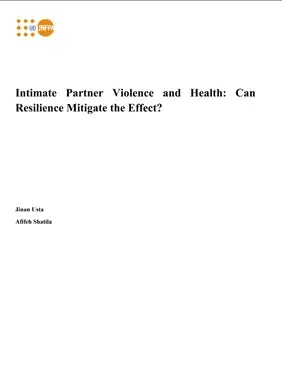Intimate partner violence (IPV) is a critical and widespread public health concern. It
encompasses physical, sexual, emotional, and financial abuse perpetrated by a current or former
partner. IPV occurs at varying degrees in all countries across cultures, religions, and
socioeconomic backgrounds, affecting women predominantly. One in three women worldwide
has experienced physical and/or sexual partner violence. Globally, 27% of ever-partnered
women between 15 and 49 years of age have known physical or sexual violence, or both, from
an intimate partner at least once in their lifetime. The magnitude of the problem among
adolescents, especially girls and young women, is also significant.
According to the World Health Organization (WHO), IPV levels vary across regions due to an
array of cultural, economic, social, and religious factors, with the highest prevalence being in
low- and middle-income countries, namely Africa, the Eastern Mediterranean, and the South-
East Asia regions. Surveys in the Arab world demonstrate that one out of three women is
physically beaten by her husband. In addition to the factors identified above, IPV rates increased
noticeably during the COVID-19 pandemic, exacerbated by lockdown and imposed social
isolation.
IPV can lead to major short- and long-term physical and mental health effects, including injuries,
sexually transmitted infections, substance abuse, depression, and unwanted pregnancies, even
death. However, resilience through social support and tertiary preventive interventions have been
linked to empowering women and assisting them in moving on from abusive situations. Hence,
fostering resilience aids women in overcoming adversity, ending the cycle of violence, and
promoting good health.
As of 2019, Lebanon has been facing an unprecedented multidimensional political, economic,
and social crisis that has aggravated violence, specifically gender-based violence, including IPV.
In Lebanon, data on IPV is lacking, making it difficult to assess its prevalence, levels, forms, and
factors. In addition, literature is scarce worldwide, and more so in Lebanon, on the linkages
between IPV, resilience, and health outcomes of IPV survivors. Therefore, there is a pressing
need to address this gap by exploring the effect of resilience on certain health outcomes among
IPV survivors.
The findings of the research aim to help improve the care of IPV survivors in Lebanon by
promoting resilience, improving the mental well-being and reproductive health of survivors, and
their ability to have informed decisions.


